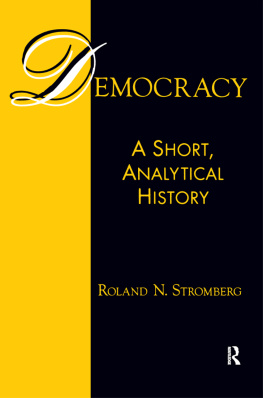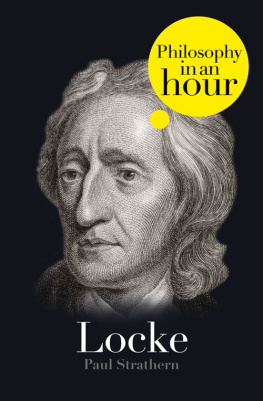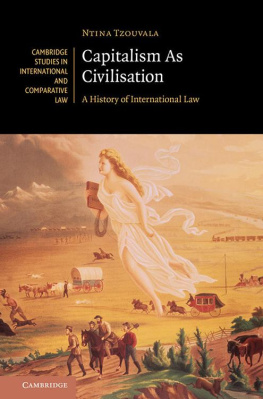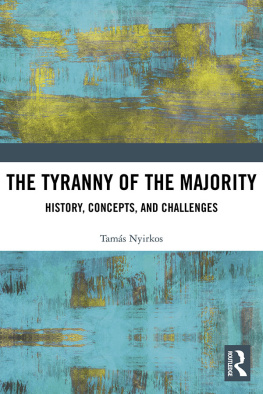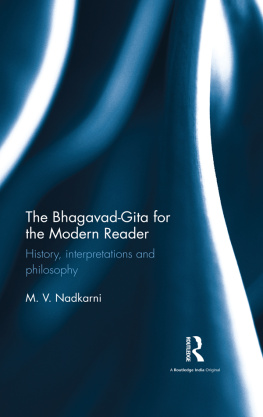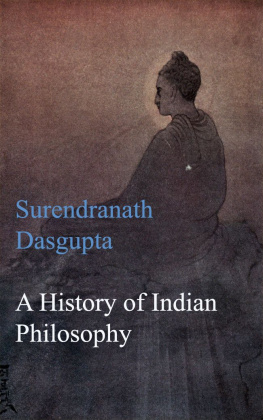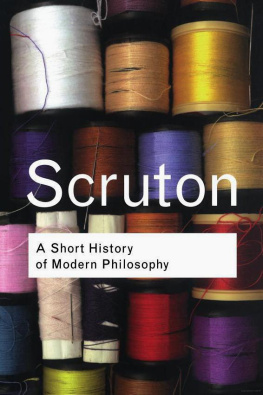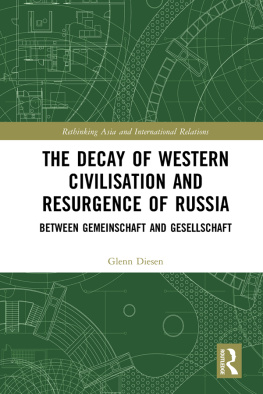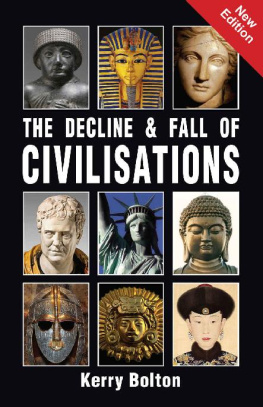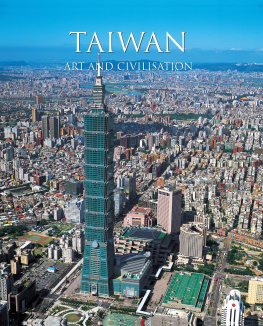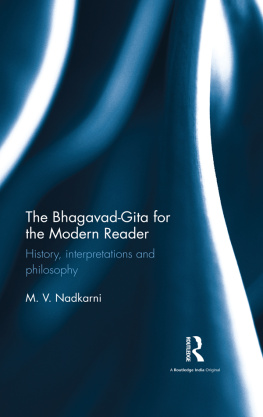DEMOCRACY
DEMOCRACY
A SHORT, ANALYTICAL HISTORY
ROLAND N. STROMBERG
First published 1996 by M.E. Sharpe
Published 2015 by Routledge
2 Park Square, Milton Park, Abingdon, Oxon OX14 4RN
711 Third Avenue, New York, NY 10017, USA
Routledge is an imprint of the Taylor & Francis Group, an informa business
Copyright 1996 Taylor & Francis. All rights reserved.
No part of this book may be reprinted or reproduced or utilised in any form or by any electronic, mechanical, or other means, now known or hereafter invented, including photocopying and recording, or in any information storage or retrieval system, without permission in writing from the publishers.
Notices
No responsibility is assumed by the publisher for any injury and/or damage to persons or property as a matter of products liability, negligence or otherwise, or from any use of operation of any methods, products, instructions or ideas contained in the material herein.
Practitioners and researchers must always rely on their own experience and knowledge in evaluating and using any information, methods, compounds, or experiments described herein. In using such information or methods they should be mindful of their own safety and the safety of others, including parties for whom they have a professional responsibility.
Product or corporate names may be trademarks or registered trademarks, and are used only for identification and explanation without intent to infringe.
Library of Congress Cataloging-in-Publication Data
Stromberg, Roland N., 1916
Democracy : a short, analytical history / Roland N. Stromberg.
P. cm.
Includes bibliographical references and index.
ISBN 1-56324-761-5 (hardcover : alk. paper)
ISBN 1-56324-762-3 (pbk. : alk. paper)
1. DemocracyHistory. I. Title.
JC421.S79 1996
321.809dc20 95-50394
CIP
ISBN 13: 9781563247620 (pbk)
ISBN 13: 9781563247613 (hbk)
Those who employ their pens on political subjects, free from party-rage and party-prejudice, cultivate a science which, of all others, contributes most to public utility.
David Hume
Of the governing tendencies of the modern world by far the most important is the spread of democracy, historian H.A.L. Fisher once observed. It is possible to make this claim for other general processes, such as capitalism, secularization, rationalization, urbanization, the growth of science and technology, but Fishers point was certainly well taken.
It is surprising how little study has been made of democratization, in comparison with the other processes. Some years ago a historian of political thought remarked on the scarcity of scholarly studies of democratic ideas. If the situation has improved since then, works of synthesis are still rare. An authoritative history of democratic thought in western civilization, one that gives adequate attention to the dialectic of thought and action, seems to be lacking. Such a work would examine how the concept of democracy came into being, entered into contact with the real world, enriched or changed its meaning, was absorbed by various groups and systems, aroused utopian hopes or suffered cruel disenchantment.
The initial problem facing any student of democracy is how to define the term. Democracy is a fuzzy term. The word is all around us; it is constantly used in the news media and everyday discourse to define our own culture and to shape our policies toward others, who are said to be delinquent if they are undemocratic and may even need to have this nebulous entity thrust upon them by force. Democracy continues to occupy large space in headlines: it triumphs over communism, is restored in Haiti, is hailed as the master principle of our age. One of the five goals for joint action by the United States and the European Union, proclaimed in December 1995, is development of democracy throughout the world. It is presented as a cure-all for troubled peoples and lands. But its failures or inadequacies even at home are also frequently deplored: books are written every year such as The Betrayal of American Democracy (William Greider). Cry Democracy! headlines The Economist (December 1987). The main political issue in the world today is the advancement of democracy, a Polish colleague of Lech Walesa proclaimed in 1989.
But there is much confusion in usage of the term. Democracy is confused with liberalism or constitutionalism or social equality or national independence; it may be taken to mean majority rule or minority rights. The meaning varies with the time and place. Democracy is invoked as a model and used to legitimize different causes for different reasons. Democracy, Christopher Hollis once exclaimed metrically, means
One thing at Moscow, one at Rome
A third in Sudan and a fourth at home.
We could add other places where the word has undergone strange transformations. Throughout the world, everybody invokes it, even tyrants. In assuming absolute power, Sheik Majibar Rahman of Bangladesh explained in 1975 that banning opposition parties and strikes was necessary in order to ensure democracy. The longtime Philippine dictator Ferdinand Marcos published a book proving that his rule was, as the title claimed, Todays Democracy. Communist-ruled countries called themselves peoples democracies. More recently in postcommunist Russia, members of the extreme nationalist party, which many dubbed fascist, and which in combination with ex-Communists strove to overthrow the precarious reform government of Boris Yeltsin, called themselves (ironically?) the Liberal-Democrats.
Politicians typically mouth the word democracy when (as is often the case) they can think of nothing else. Democracy is a hurrah word. A British politician of the late nineteenth century said that, when asked a hard question at a public meeting, his habit was to mention the name of Gladstone, the popular Liberal party leader; this gave him time to think because it set off five minutes of cheering. Much the same is true of democracy. At the extreme limits of vagueness, we find the word used simply as a synonym for good, as when, for example, the Russians are said to behave un- democratically when they wage war on Chechnya (as if democratic governments never went to war). Or general histories of the United States are titled, for example, The Making of a Democracy. William L. ONeill calls his book on the United States in World War II A Democracy at War.
Definition of the term has often depended on local conditions and special circumstances. For example, when in the 1980s the old British Liberal party merged with elements from the right wing of a bitterly divided Labour party, who called themselves Social Democrats, the new party decided to adopt the name of Liberal Democrats. (Social Democrat was the name of the pre-1914 Marxist parties, including Lenins in Russia, but in British usage it tended to convey more democrat than socialist.) The term democrat for the British was a symbol that invoked a sense of being progressive yet moderate, committed to public welfare yet not dogmatically socialist. It was also a title extracted from the names of the two merging parties. One would have had to follow the intricacies of British politics over a long period of time to understand this meaning fully. Every term, G.K. Chesterton remarked, comes to us coloured from all its adventures in history. Democracys adventures have been unusually long and varied.

